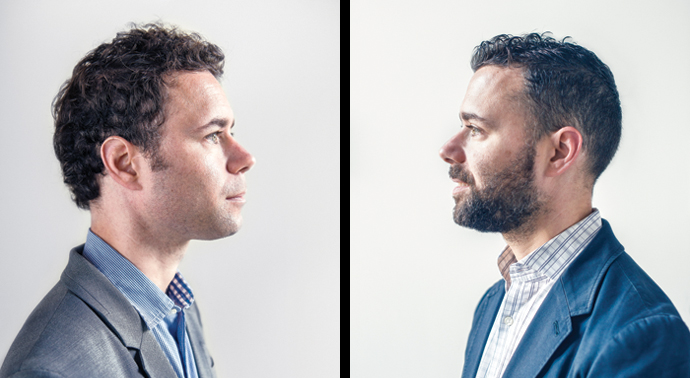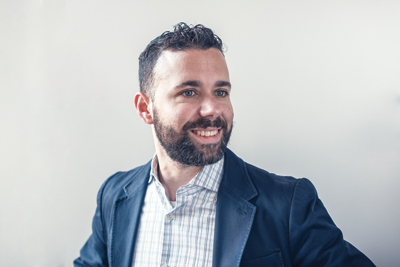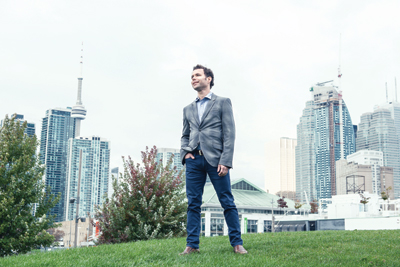
By Alec Scott, LLB 1994 / Photography by Jason Gordon
From the Fall/Winter 2013 issue of Nexus.
“Are our similarities or our differences greater?” asks Matt Cohen, speaking about his twin brother Jonathan.
At first the answer seems easy. I interview both of them—Matthew in his Toronto office, Jonathan in a restaurant on Manhattan's Upper West Side—and their similarities are many and striking. They share a certain look and some mannerisms: dark curly hair, kept short; trim forms; big, searching eyes; an identical way of tilting their heads when asking a question. Their equally strong convictions get leavened by a snappy, distinctively Nova Scotia-style irreverence—they grew up in Halifax. Matt is nine minutes older—“and he won't ever let me forget it,” Jonathan says. But this means Jonathan, the youngest of five children, gets to ask the four questions at the Passover Seder.
After graduating from U of T law one year apart, they had many options open to them. Jonathan (Class of 2000) clerked at the Supreme Court (for Mr. Justice Michel Bastarache), and Matt (Class of 1999) landed a plum position at Osler, Hoskin & Harcourt LLP. But both have ended up pursuing work that might loosely, in one case, and precisely, in the other, be called pro bono publico, work for the public good.
Jonathan moved from Ottawa to New York to work for Human Rights Watch, and is now the deputy director of the public health program at the George Soros-founded Open Society Foundations. Matt left Osler to do a master's in human rights law at the University of Cape Town and returned to Toronto to work for a small firm advocating on behalf of the mentally ill. He is now director of litigation projects at Pro Bono Law Ontario (PBLO).
In most families, the twin lawyers would be far and away the highest achievers, inevitably the first spoken of by the proud parents. But they see themselves as outsiders, not the heirs to the throne in a medicine-and-science dynasty in the making. Their now deceased father headed nephrology at a Halifax hospital, and their mother, the daughter of Holocaust survivors born in a displaced persons camp, became a top-tier biochemist. Two older siblings are doctors, and the other works in genetic counseling.
“Honestly, we are the black sheep,” Jonathan says.
Matt elaborates: “When we went to university, there was this sense that ‘They're both doing a BA? What went wrong?’ ”
In separate cities, they make this same fancy bit of self-deprecation. But after some time with each of them, they start to differentiate, to come into focus as individuals, not halves of a duo.
Jonathan Cohen
Jonathan arrived at U of T law in 1997, after doing his undergrad at Yale and a master's at Cambridge. (“He was always strong academically, always,” Matt says.) He was co-editor-in-chief of the Faculty of Law Review and did an International Human Rights Internship at Unicef in Thailand.
Walking to work at the Supreme Court one day, along Wellington Street in Ottawa, he figured out what he wanted to do with his life. “I knew I wanted to work on AIDS internationally. It engaged all sorts of things of interest to me—gay rights, women's rights, children's rights, prisoner's rights, economic, social, cultural rights.” To see if there was some possibility of actually doing it, he approached Madam Justice Louise Arbour. She'd just come off several years prosecuting war crimes allegedly committed in Rwanda and the former Yugoslavia. “After hearing me out, she said I should pursue it. Without her letter and the field work in Thailand, I'm pretty sure I wouldn't have landed my first job in this area.”

At Human Rights Watch, Jonathan focused on AIDS and human rights (as he had hoped), producing a report on the way that Thailand's so-called War on Drugs was helping the disease to spread, first among intravenous drug users, but moving on from there. “We released the report while an international AIDS conference was happening in Bangkok, one of my first experiences of “Name and Shame,” using a big international event hosted by a country to embarrass them into action.”
Another report targeted Uganda's use of some of the $15-billion that George W. Bush's regime earmarked to fight AIDS in Africa for programs promoting abstinence from sex before marriage. “The Ugandan government was interested in hoarding money and attention to distract from the other human rights abuses they were committing—for a program that does not work, that was based on religion not science.”
In 2006, he moved to the funding side of the equation, joining the New York-based NGO, the Open Society Foundations.
Jonathan was married in the fall of 2012 at the Yale Club to his same-sex partner, an Emmy-winning film editor, in a wedding celebrated in the pages of The New York Times. “I had one request for our honeymoon—that we not go somewhere I'd been for work, or that was connected to work. It wasn't easy, but we ended up going to Argentina.”
Lately, the NGO he works for has paid more attention to Burma. “This organization was founded to help the Eastern Bloc countries move towards democracy, and so, in a different context, we've worked on these issues before. What interests me is that unlike the bottom-up movements of the Arab Spring, this was the elite, tired of their country being an international pariah. You never know what's going to turn things, which approach will work.”
Matt Cohen
Matt Cohen does the interview in a box-filled boardroom in Pro Bono Law Ontario's offices. Until this past summer, the organization occupied part of the old Bank of Upper Canada Building and its neighbour on Adelaide Street East.
It's a site where two distinct political visions of Toronto once clashed. In 1837, a handful of rebels led by egalitarian firebrand William Lyon MacKenzie proposed to bankroll their uprising with gold from this very building. Now, in a sense, those pushing for a more just society are within, inside this Second-Empire low rise, just east of Toronto’s downtown core.
There's sunlight coming through the tall windows of the boardroom, as Matt tells me about two big upcoming developments for him. When we speak, PBLO is getting ready to move from this building into a more convenient, but less storied, office across town, in a restored warehouse, and the enthusiastic athlete is about to undergo knee surgery. Boxing is the married father of two's latest obsession, joining tennis, basketball and baseball. “I need my exercise, so that's going to be tough,” he says. “I'm planning to focus more on cooking during the [six-month] recovery period.”
I can tell he wants to win in the kitchen, too, another passion of his. Perhaps this is not a surprise given what I've seen on his resume: in addition to the athletics, he was a debater in high-school, and one of the top competitive mooters of his year when he was at the Faculty of Law. He summered at Osler, Hoskin & Harcourt LLP, then joined it after he graduated. But in person, he doesn't come across as terribly Type A. Of the twins, he seems more the one to let life come at him, and decide what to do then.
“It's probably come as no particular surprise to anyone who's known me that this is what I'm doing, working in social justice, in law. But I came to these things in stages—usually following my brother, who was generally one step ahead.” But he adds: “Still I'd do so for my own reasons.”

I'm not sure how I expected him to describe his decision to leave Osler, to do a master's focused on human rights law in Capetown. Or how he might speak of his decision to switch gears still further when he came back to Toronto, first joining Swadron Associates, a small firm that has advocated fiercely for the rights of the mentally ill for years, and then PBLO.
But there's no left vs. right, radical vs. establishment, MacKenzie vs. the Family Compact to it. He liked Osler, respected the training and the lawyers with whom he worked, and the specificity with which he describes the work, the names he gives to his lawyer colleagues and supervisors, gives chapter and verse of his liking. “I was never a malcontent. I just thought after three years … I was single at the time, had saved some money, I still had some of these other interests—travel, the developing world, it all came together. And I could feel the fulfillment my brother was getting out of his work in New York [with Human Rights Watch].”
Cohen studied the new South African constitution at the University of Cape Town, focusing on its most revolutionary aspect—the enshrinement of social and economic rights (housing, education, employment) in the new instrument. “It was influenced by our Charter, but explicitly took that one major further step beyond the civil and political rights,” he says. But hope for the future wasn't his takeaway. After a backpacking trip from the Southern tip of the continent to Eritrea, he concluded: “Basically, you end up being overwhelmed by the scale of untapped potential on the continent.”
He came back determined to do something, but what wasn't clear. He found he was drawn to the father-and-son firm Swadron Associates and its long-time commitment to the rights of the mentally ill. It was during his time at Swadron that he met and married his wife, another lawyer, who currently works at the Ontario Attorney-General's office. After a time, PBLO, a registered charity, approached him. Would he act as a resource for the organization's help centres giving legal and strategic advice to unrepresented litigants? Eventually, he moved to the organization full-time.
PBLO's focus is the civil courts, not criminal or family. Although he comes across litigants facing mental health challenges (“that work with Swadron remains relevant”), he finds the time at Osler also helps. “Many of the lawyers we ask to take on major impact litigation are at the big firms, and it helps me to know, from having been there, the other challenges they're facing in their practices, where they're likely to have expertise, and where less so. It might surprise you but it's generally not a hard sell to get people, even terribly busy lawyers, to take on this work. The commitment to do so is out there.”
Conclusion
A paradox: if either of them found it easy, they probably wouldn't have gone in for this kind of work. Both have aligned themselves with organizations taking on intractable issues—Jonathan the promotion of democracy and public health in the world, Matthew, access to justice. For his part, Jonathan says of the field reportage he's done: “Ultimately with human rights documentation, you're providing people an opportunity to tell their story …” Then he sighs. “For most of them, that's the most justice they're ever going to get.”
Matt is similarly a realist about his work. “Frankly there are many moments of perceived failure, periodic feelings of futility to be honest. Today I am to look at the various aspects of this case that came in through the help centre. This guy is pursuing so many remedies – and there seems to be a grain of injustice here. But I'm not sure he's going to win on any of them. I suspect he should, but there's a good chance he won't.”
But Matt decides to end our interview on an upbeat note. “Still, when you look in broad strokes at the progress in these causes—the rights of the mentally ill compared to 50 years ago, the spirit of self-help and pro-bono now as opposed to even 10 years ago—we're making headway.”




